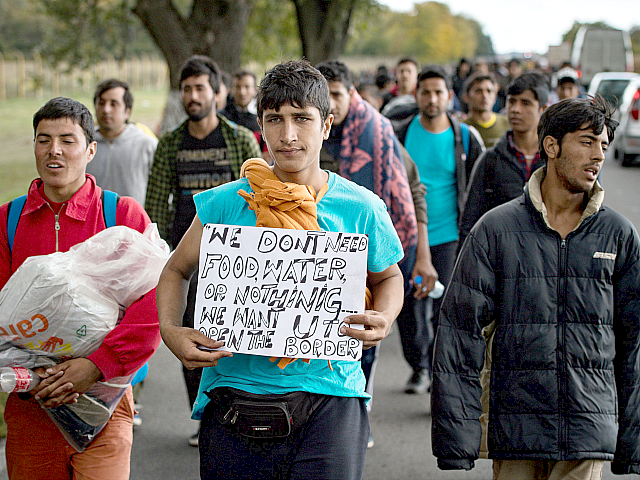The Court of Justice of the European Union has rejected the advice of one of its own Advocates-General to rule that migrants can be sent back to the bloc’s border states from the interior, effectively overturning the “open door” policy ushered in by Germany’s Angela Merkel in 2015.
The court deemed that the European Union’s Dublin III regulations still apply, despite the mass influx triggered by Chancellor Merkel’s unilateral declaration that there was “no limit” on the number of migrants her country would accept. The rules require would-be asylum seekers to lodge their claims in the first EU country they enter, and allow more distant EU countries to send them back to their original point of entry — if it can be identified.
EU judges made this decision despite their own Advocate-General Eleanor Sharpston – a British lawyer – warning that maintaining the current system in the face of the influx would leave border states such as Italy and Greece “unable to cope”.
The rulings were in response to a case brought by Croatia, which was objecting to Austria and Slovenia sending migrants who had been allowed to cross their territory – in line with the German invitation – back across the border.
Hungary rejects EU's court demand for it to submit to 'Soros Plan' for compulsory migrant quotas. https://t.co/qrga9kAt9e
— Breitbart London (@BreitbartLondon) July 26, 2017
In a seemingly contradictory move on the same day, however, another Advocate-General for the EU court anticipated its likely ruling on the objections of Hungary and Slovakia to the imposition of compulsory migrant quotas on EU member-states which did not share Germany’s enthusiasm for mass migration, advising that the European Council does indeed have the power to dictate such measures.
Hungarian foreign minister Péter Szijjártó said his government would await the court’s ultimate decision, but took the opportunity to blast the quota scheme as part of the “Soros Plan” to flood Europe’s nation-states, and took aim at the EU for welcoming the billionaire open borders activist to Brussels “with the pomp and ceremony usually only reserved for heads of state” recently.
In any event, however, if the court decides to allow Central and Northern European countries to send migrants back to EU border states while also upholding the bloc’s right to forcibly redistribute migrants from those border states to the wider continent, it will send confusing signals on its wider strategy for tackling the migrant crisis, with critics suggesting it remains in a state of disarray years after the crisis first began.
Merkel Spokeswoman Quits Over ‘Open Door’ Policy; Claims ‘Political Will’ Behind Illegal Migration https://t.co/0H1oUNliKN pic.twitter.com/t80ryB7UjW
— Breitbart London (@BreitbartLondon) January 15, 2017
The Dublin III regulations do not allow countries to send migrants back to the last EU member-state they were in, unless this was also the very first EU member-state they came to.
This means, for example, that many thousands of illegal migrants who arrive in the United Kingdom from France cannot simply be sent back across the Channel, even if they have no legitimate asylum claim — the authorities must identify the first EU country they entered and send them there instead.
Migrants are not typically willing to divulge this information and there is seldom a document trail leading back to their original point of entry – Breitbart London reported in late 2016 that some 80 per cent of those who make it as far as Germany have no papers with them, often because these have been intentionally destroyed.
Henry Bolton OBE, former head of the Borders Unit at the Organisation for Security and Co-operation in Europe (OSCE), had previously explained to Breitbart London how this unusual regime has hampered Britain’s ability to tackle illegal immigration as an EU member – with only fourteen out of several thousand illegal arrivals from Calais being returned to France in 2014, for example.

COMMENTS
Please let us know if you're having issues with commenting.